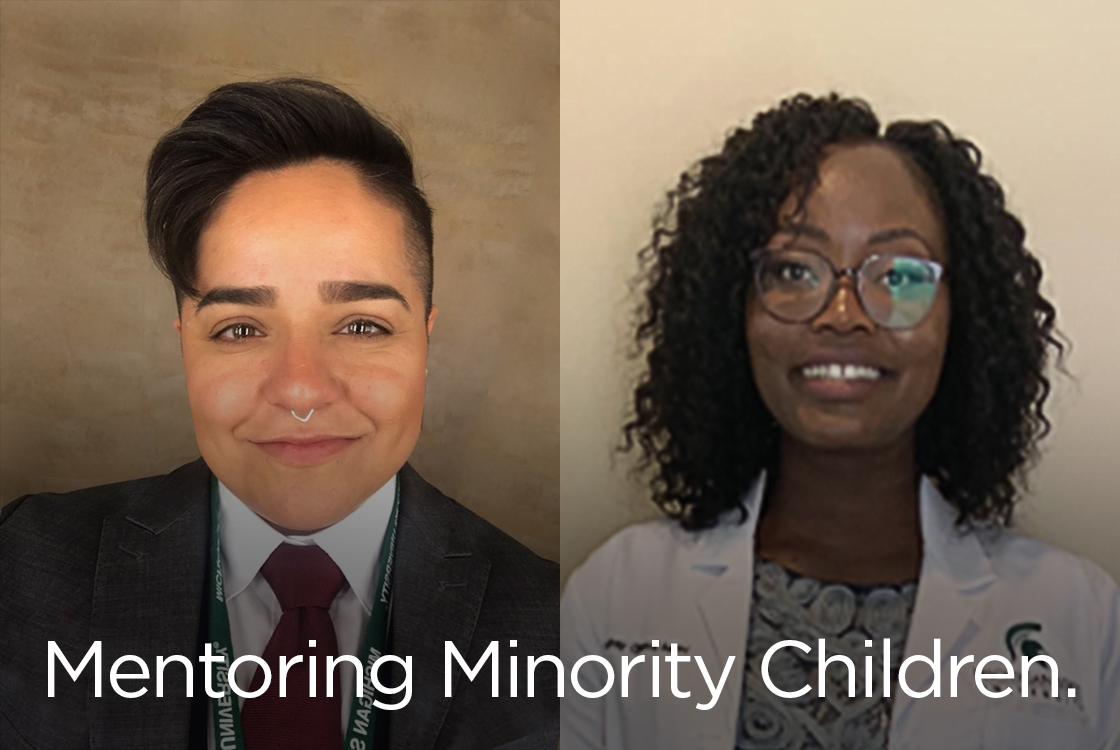LMSA and SNMA Students Serve as Mentors to Minority Children
August 9, 2021
 When Audrey Ogendi was in fifth grade, her teacher told her, “Audrey, you’re going to be a leader.”
When Audrey Ogendi was in fifth grade, her teacher told her, “Audrey, you’re going to be a leader.”The seed planted back then has grown, and Ogendi, entering her third year in the College of Human Medicine, is sewing more in the minds of young people as one of many medical students volunteering at Baxter Community Center in Grand Rapids.
“Mentoring is so important to me,” she said. “I want to plant a seed in these kids’ minds that you can be it if you just believe.”
She and the other College of Human Medicine students have been doing just that in Baxter’s Mizizi Maji (Swahili for “roots of water”) Youth Mentoring Program, which encourages academic excellence by exposing young people to different ideas and possibilities.
“I really enjoy working with the MSU students,” Mizizi Maji Program Director Erica Millbrooks said. “They are such a great help. They all come with positive attitudes. If it wasn’t for them, I don’t think it would be as successful as it’s been the last few years.”
Particularly helpful were the Latino Medical Student Association (LMSA) and the Student National Medical Association (SNMA), both committed to supporting minority medical students.
Sarak Kenney, entering her third year in the College of Human Medicine, persuaded LMSA to provide a grant supporting the students’ efforts to teach the Baxter kids about science, technology, engineering, and mathematics.
“It reminds me of why I came to medical school,” said Kenney, who was vice president of the LMSA chapter at MSU and treasurer of the SNMA chapter. “I came so I can give back to my community and help others who don’t have access to medical care.”
As a Latina and the first member of her family to attend college, she believes it is important for the minority kids at Baxter to see role models who look like them. Teaching and inspiring the kids during the COVID-19 pandemic posed a particular challenge.
“I thought COVID would make it more difficult,” Ogendi said. “It actually made it more innovative.”
During the peak of the pandemic, the MSU students prepared kits to be delivered to the Baxter kids’ homes and taught classes online, covering topics such as chemistry. As the pandemic waned, they met in person every other week, teaching about viruses and bacteria, taking the kids on a scavenger hunt, showing them how to make hand sanitizer, and helping them build solar-powered chargers for cellphones.
In a broader sense, the medical students opened the kids to a world of possibilities.
“You cannot be what you cannot see,” Ogendi said.
She saw herself in one 11-year-old girl, who had changed schools many times. Born in Kenya and raised in the United States, Ogendi, too, had moved many times.
“We talked about that,” she said. “I told her to keep practicing. I know I planted a seed.”
Besides, “home is where you’re most useful,” she said, adding that “I’ve gotten more out of this than I put in. I learned compassion from the kids. They give me a drive and energy.”
And they gave her something else.
“I gained a new-found friendship,” Ogendi said. “Actually, I gained a family. Baxter has become my family.”

